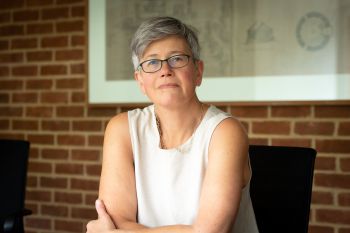Response to Open Letter from Sussex UCU and USSU Executive
Posted on behalf of: Internal Communications
Last updated: Friday, 3 May 2024

Professor Sasha Roseneil, Vice-Chancellor
The Vice-Chancellor, Professor Sasha Roseneil, wrote to all staff and postgraduate researchers earlier today (Thursday 2 May). The same email was also sent to all taught students. You can read the full message below:
Dear Colleagues,
Everyone reading this message will be aware of the strength of feeling that is being expressed in many places around the world about the violence and loss of life and habitats in Gaza and across the Occupied Palestinian Territories since the terrorist attacks and hostage-taking by Hamas in Israel last October.
Last week I received an open letter about the University’s position on the situation, and yesterday, members of the University Executive Team and I met with representatives of the University and College Union (UCU) and the Students’ Union (USSU) to talk about the issues raised. Members of our community at Sussex have been peacefully protesting and expressing their lawful opinions in a range of ways over recent months and we remain committed to supporting this, and we respect the positions articulated in the letter, as well as by colleagues with a range of other views.
Socially responsible investment
The University’s Socially Responsible Investment Policy was introduced in 2016-17, following a process of development led by Council. After yesterday’s meeting, I will be recommending to Council that we establish a new group, which will include student and staff representatives, to review this policy, and to consider how it should be updated to ensure that the University’s approach to socially responsible investment reflects our institutional values and remains sector-leading.
Our current Socially Responsible Investment Policy, among other things, requires our investment managers to consider human rights, good business ethics and employment practices, and the protection of the global environment, its climate and biodiversity. In addition, the University will not invest in tobacco, gambling, pornography, and arms. The policy also expects our investment managers to consider the promotion of international cooperation and an end to international conflict. This is a strong and effective policy, and our investment managers have been responsive to feedback from the University community about some of our investments over recent years, which has led to acts of divestment. However, in light of changing global contexts and investment opportunities, it is right that we review our policy, testing it with our community, and seeking best-practice in ethical investment.
Institutional statements
From yesterday’s meeting, as well as through conversations with students and colleagues over the last few months, I know that some members of our community are disappointed that the University is not taking a specific institutional position on the conflict in Israel-Gaza/Palestine. I would like to set out the reasons for this, and the principles that underpin it.
According to our founding Charter, the University of Sussex exists ‘to advance learning and knowledge by teaching and research to the benefit of the wider community’ (University Charter, as revised in 2012, para 3). It is through the critical thinking and challenging questions posed by our academics, and through their rigorous research and inspirational teaching, as well as through the curiosity, dedication and energy of our students and alumni that Sussex makes its impact on the world. The University’s work of education and research rests on a foundational commitment to academic freedom and freedom of speech, and the University must be a place in which diversity of belief and thought, as well as of background and identity, discipline and method, should not just be tolerated but actively encouraged and nurtured.
This is why, I believe, the University as an institution should refrain from making statements about matters that are external to the running of the organisation which might foreclose debate and discussion, or that make judgements about contested issues on which there are a multitude of views amongst our community. It is our responsibility as a University to encourage and support all members of our community to freely express their views and beliefs within the law, and to protect and promote colleagues’ academic freedom. This involves creating and sustaining an environment that fosters and supports a diversity of views and opinions for all members of our community. We are, and must continue to be, a site of intellectual disagreement and contestation.
None of this limits individual members of our community from taking any positions they judge right and appropriate, but it does limit the positions and views that Sussex, as an institution, can adopt.
Our institutional values of collaboration, courage, inclusion, integrity and kindness are overwhelmingly supported across our community, and continue to guide and shape how we live and work together, as does our rejection of antisemitism, Islamophobia, racism and hostility towards Palestinians, and all other forms of discrimination and harassment.
Support for Palestinian students
Sussex has long been committed to providing practical support to students and academics in times of crisis and from places experiencing war and conflict. For example, we offer Sanctuary Scholarships, Said Foundation Scholarships for students from Jordan, Lebanon, Palestine, and Syria, Higher Education Scholarship Palestine (HESPAL) scholarships, and Council for At Risk Academics (CARA) PhD scholarships. We are currently looking at how we might expand our support for Palestinian students, academics, and universities, in the context of the destruction of the educational infrastructure in Gaza.
Many of you reading this might disagree with some of what I have said here, but I hope that I have explained the principles with which we are operating. I would like to thank the representatives of UCU and the Students’ Union for our constructive and collegial meeting yesterday. We did not agree on everything, but I think we did, at least, engage in meaningful dialogue about these important issues.
With my best wishes to all,
Sasha
Professor Sasha Roseneil
Vice-Chancellor
